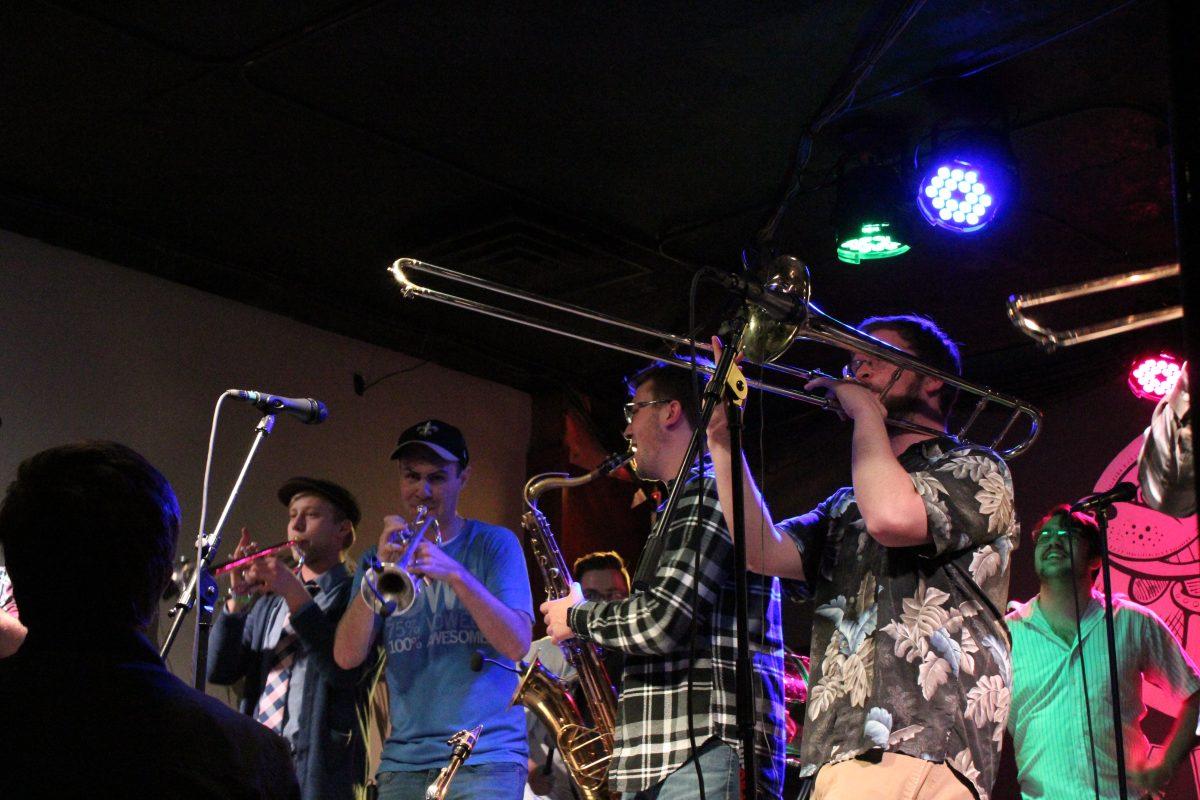Photo by Adam Rogan
BY KATHERINE BAUER
On any given night, music rings out at Lefty’s Live Music in Dogtown. However, once 9 p.m. strikes, there is often a noticeable difference.
When 9 p.m. comes along, everyone who is not 21 or older has to leave. A Des Moines city ordinance holds that 20-year- olds and younger are not allowed in bars after 9 p.m., including music venues that have a liquor license.
The Des Moines Music Coalition (DMMC) and Lefty’s are trying to change that. Last Thursday, an event called Lights out at Nine attempted to draw attention to the “archaic ordinance,” according to Lefty’s co-owner and book manager Erik Brown.
“I’ve never been to another city that has something that feels like 1950s America,” Brown said. “We’re talking about arts. We’re not talking about night life scenes. I think when you limit people seeing art or experiencing art, it’s just a very old America we see, and that’s not what we are.”
Advocates through the years have taken on the ordinance but have never succeeded in changing the law.
“(The ordinance) is unrealistic for venues to uphold the restrictions it puts on them,” said Molly Brandt, the advocacy coordinator for DMMC and a senior music/business major. “Ultimately, it hurts the music scene in Des Moines and hurts our young people’s access to art and culture, to entertainment.”
The DMMC looks to gain support for the movement and perhaps even get it changed this year.
“This event serves as the kick- off event for this campaign,” Brandt said. “We really wanted to gauge some interest from high schools students and college students, especially Drake students with (Lefty’s) being so close to campus. We wanted to see what kind of reaction we get, speak about the issues, inform people on it, get people involved.”
People want to change the law because they believe it will give Des Moines an economic and cultural boost.
“When you disclude an entire segment of the population from going to these affordable, accessible, casual and diverse live music performances, you’re going to lose your future customers who want to stay in Des Moines,” Brandt said. “You’re losing retention of the area youth. We want to make it so that touring bands want to come to Des Moines and want to do shows for all ages. We really need to eliminate this in order to get Des Moines to the next level of being a live music city.”
Brown echoed that Des Moines needs to take steps to keep young people in Des Moines after high school and college.
“It can determine if your market stays small and not be able to bring in big bands,” Brown said. “It’s important from an economic standpoint. For a city to grow and to retain its youth, you have to offer things for them to do.”
One young performer said bringing in those big bands would help the music scene itself to grow along with the city.
“(Changing the law) would benefit not only the youth to be able to go to the shows they want to, but it would help everyone, because the more you get the kids involved in the music scene, the music scene will grow more when they can go to the shows they want to,” said Louise Bequeaith, a member of the band Glitter Density.
Bequeaith was one of several people to perform under the age of 20 as part of Lights Out at Nine. She said live music performances are important to get young people involved in the art.
“Without venues like this, me and (my bandmate) wouldn’t have a place to experience (live music) or know it’s something that we love to do or that we love to perform in front of people,” Bequeaith said. “Having a place that opens its doors to you is what shows you the possibilities, because without it, we wouldn’t have a clue.”
Live music has a unique impact on young artists, according to Drake senior Nick Gardner.
“It’s much more personal to be able to see live bands perform rather than watching or listening to them on the internet,” said Gardner, a music education major. “When you watch bands perform live, you get to see the emotion and energy come out from their lyrics or horns.”
However, Gardner can see the concern lawmakers had when implementing the ordinance.
“If I’m imagining myself as a bar owner, I would be worried about the liability of having minors at my bar late at night,” Gardner said. “I would be worried about them getting alcohol from employees that were careless when checking identification.”
Gardner and Brown both noted, however, that proper training and precautions can avoid such issues.
“We’re proactive,” Brown said. “We have a lot of safeties in place to make sure that if, you’re in here and you’re under age, that you’re safe, that staff makes sure you’re doing everything that’s within the law and having a good time. We work hard to bring music to people who are 16 years old as well as 45 years old.”
Brown said he believes Lefty’s can continue these practices after 9 p.m. and added that the ordinance could simply extend the out time from 9 until 11:30 p.m., when shows usually finish up.







